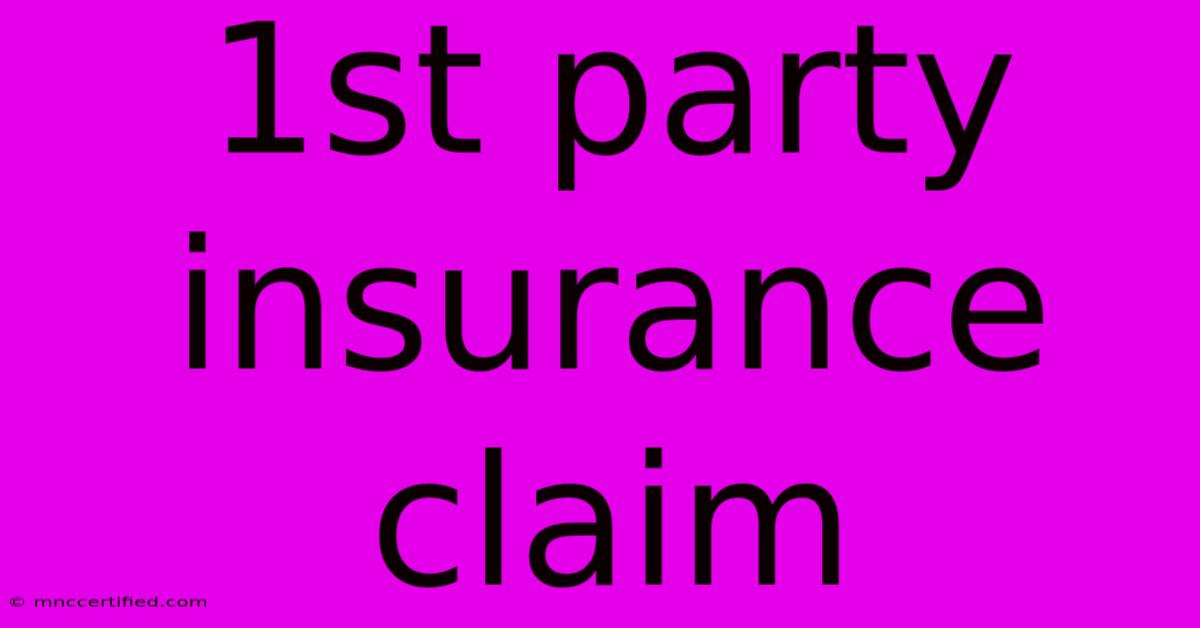1st Party Insurance Claim

Table of Contents
Navigating Your First-Party Insurance Claim: A Comprehensive Guide
Filing a first-party insurance claim can feel overwhelming, but understanding the process can significantly ease the stress. This guide provides a comprehensive overview, helping you navigate each step effectively and maximize your chances of a successful claim. We'll cover everything from understanding what constitutes a first-party claim to appealing a denied claim.
What is a First-Party Insurance Claim?
A first-party insurance claim is a request for compensation you make to your own insurance company. This differs from a third-party claim, where you seek compensation from someone else's insurance company (e.g., after a car accident caused by another driver). First-party claims typically involve incidents covered by your policy, such as:
- Homeowner's Insurance: Damage to your property from fire, wind, hail, theft, or other covered perils.
- Auto Insurance: Damage to your vehicle from an accident (if you have collision or comprehensive coverage), theft, vandalism, or other covered events.
- Renters Insurance: Damage to your belongings or the apartment itself (if you have liability coverage) due to a covered event.
Steps to Filing a Successful First-Party Insurance Claim
Filing a first-party insurance claim involves several key steps. Following these steps meticulously will increase your chances of a smooth and successful outcome:
1. Report the Incident Promptly
Contact your insurance company immediately after the incident. The sooner you report it, the quicker the claims process can begin. Note down the date, time, and details of the incident. Take photographs or videos of the damage as evidence.
2. Gather Necessary Documentation
Before contacting your insurer, gather all relevant documents, including:
- Policy Information: Your policy number, coverage details, and contact information.
- Proof of Loss: Detailed documentation of the damages and losses incurred. This could include repair estimates, receipts, and inventories of damaged property.
- Police Report: If applicable, obtain a copy of the police report filed regarding the incident.
- Witness Statements: If there were witnesses, gather their contact information and statements.
3. File Your Claim
Follow your insurer's instructions for filing a claim. This may involve contacting them by phone, online, or mail. Be prepared to provide detailed information about the incident and the damages.
4. Cooperate with the Adjuster
An insurance adjuster will be assigned to investigate your claim. Cooperate fully with the adjuster, providing all necessary information and documentation promptly. Be honest and accurate in your communication. Schedule inspections and appraisals as requested.
5. Review the Settlement Offer
Once the adjuster has completed their investigation, they will offer a settlement. Carefully review the offer to ensure it accurately reflects the damages and losses you've suffered. Don't hesitate to negotiate if you believe the offer is insufficient.
6. Understand Your Rights
Know your rights as a policyholder. Your insurance policy is a legal contract, and you are entitled to fair and prompt handling of your claim. If you feel your claim is being unfairly handled, consult with an attorney.
Appealing a Denied Claim
If your claim is denied, don't give up. Understand the reason for the denial and gather additional evidence to support your claim. Follow your insurer's appeals process outlined in your policy. If necessary, consider consulting a lawyer specializing in insurance claims.
Key Considerations for a Smooth Claim Process
- Maintain Detailed Records: Keep records of all communication, documentation, and expenses related to your claim.
- Understand Your Policy: Familiarize yourself with the terms and conditions of your insurance policy.
- Be Patient and Persistent: The claims process can take time. Remain patient and persistent in pursuing your claim.
- Seek Professional Help: If you're struggling to navigate the process, consider seeking assistance from a public adjuster or attorney.
Filing a first-party insurance claim can be a challenging but necessary process. By understanding the steps involved and being prepared, you can significantly increase your chances of a successful outcome and receive the compensation you deserve. Remember, proactive communication and thorough documentation are your best allies.

Thank you for visiting our website wich cover about 1st Party Insurance Claim. We hope the information provided has been useful to you. Feel free to contact us if you have any questions or need further assistance. See you next time and dont miss to bookmark.
Featured Posts
-
Allegri Linked To Struggling Premier League Side
Dec 10, 2024
-
2025 Golden Globes Wicked Leads Nominations
Dec 10, 2024
-
Bella Hadids Yellowstone Cameo Shocks Fans
Dec 10, 2024
-
Alina Habba Trumps Chosen Lawyer
Dec 10, 2024
-
Champions League Projections 16 Teams 75 Done
Dec 10, 2024